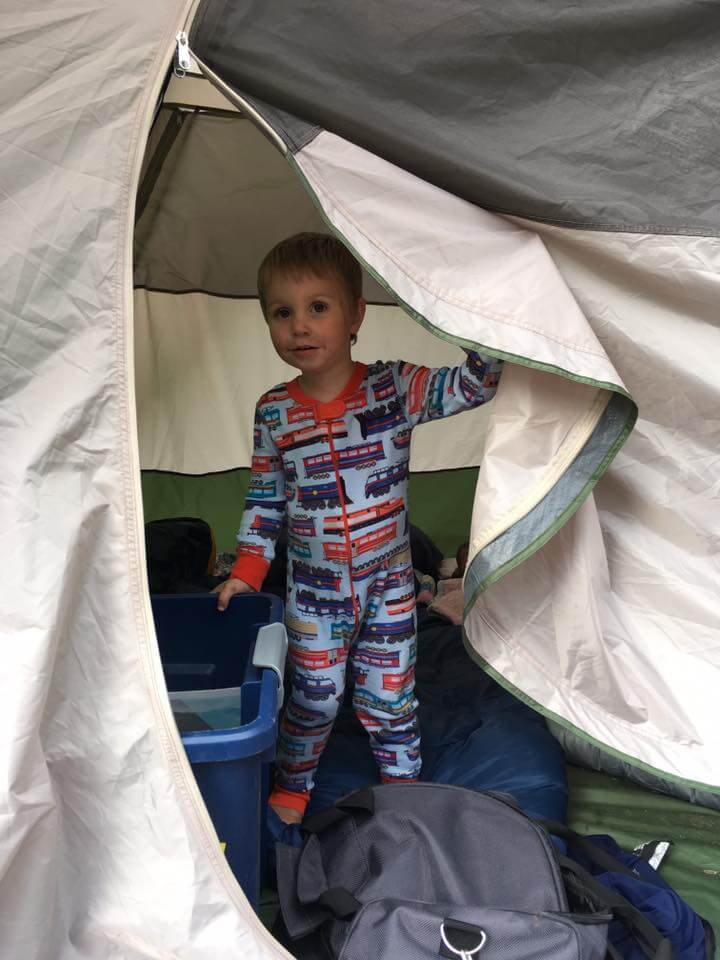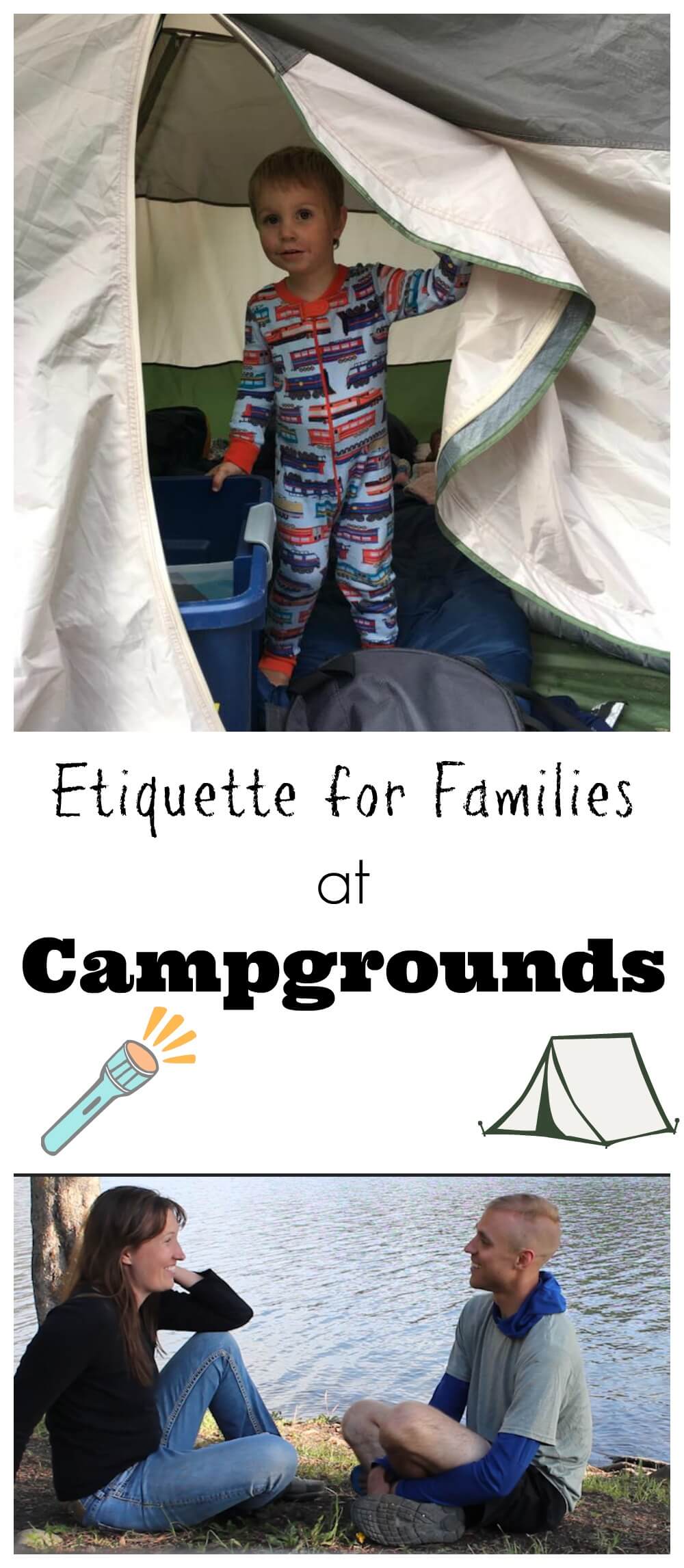 This is a continuation of our Down and Dirty Guide to Family Tent Camping!
This is a continuation of our Down and Dirty Guide to Family Tent Camping!
Among first-time campers, it’s tempting to think this is a time to be free and let the kids finally run wild, taking some relaxation for yourself. This can be inconsiderate of others, it’s important to teach children to be respectful.
Here are some guidelines so that you’re able to enjoy the great outdoors, and everyone else can too.
Campsite Etiquette
Campsites are a shared space, and a great place to help children learn to read a new situation and behave in a way that is appropriate, fun, and still considerate of others.
Just as we teach kids to stay on the trail to prevent erosion, not pick the last wild flower so everyone can enjoy, and absolutely not litter, noise pollution is also important to avoid.
Children who are in tune with others can simply be encouraged to observe what other people are doing, think about why they may be doing it that way, and ask if they aren’t sure of something.
For children with black-and-white thinking, you may need to have specific ‘camping rules’. This can also be called scripting. This is helpful for spectrum-y kids and preschoolers. This might be a little advanced for most toddlers, which other campers nearly always are very forgiving of.
For example, if the children have learned that yelling and ‘outside voices’ are appropriate for the playground, new rules may be that we need to use walkie-talkies to talk to each other in normal talking voices, or only use inside voices at all time because our voices carry across the lake. You can make this into a game, or just matter-of-fact spell out the rules.
In general, this is acceptable:
- Laughing, giggling, talking- just try not to crowd where other campers are reading or doing another quiet activity.
- Big groups being a little louder. (tip: when reserving a campsite, look to make sure it’s not near group campsite if you would like quiet :) )
- A little more noise during a game, especially if you include other campers.
- Toddlers squealing with delight, or periodic fussing/shrieking.
- Babies and toddlers crying/fussing/protesting for 10ish minutes as they go down for a nap/to sleep.
- Occasional laughing and raising voices around a campfire.
- Kids doing ‘happy yells/screams’ when catching a fish, falling into the lake, win at Uno etc.
- Dogs that bark excitedly as they wait for you to throw a stick, during daytime hours.
- Asking your campsite neighbors if they have a spare of whatever you forgot (I forgot everything for lighting a fire last time! Friendly neighbors gave me a healthy supply of strike-anywhere matches).
In general, this is not acceptable:
- Shouting from raft to raft across a lake to other people, unless it’s a small campground and all the camper kids are out there and involved in the middle of the afternoon. Camping can really bond people together, especially if you go the same dates and to the same place year to year.
- Rowdy/noisy games before 9 am or after 7 pm.
- Dogs that bark at every squirrel, passer by, or creaking branch.
- Making noise or throwing rocks where people are fishing.
- Electronics (the radio, a tablet that can be heard from another campsite). We typically don’t go outside and sleep on the ground to hear the top 40 radio station ;) This may change if you’re in a popular ‘party spot’.
- Bright lanterns that will shine through someone else’s tent when you’re on the way to the bathroom or ruin their night vision if they are out without a flashlight. Use a small flashlight and point it at the ground.
- Driving fast so that dust kicks up on the roads where people are walking – drive slow not only to avoid hitting wildlife, but also to avoid creating your own personal dust storm.
Campsite Rule Enforcement
Children who do not follow the noise rules for me usually sit in the car with me until there is a better understanding (car on and AC on if it’s hot) The car buffers the sound in case this interruption causes an increase in noise ;) For children who have a hard time with impulse control, starting with day trips and trail/fishing etiquette a few hours at a time can help.
For some kids, a movie in the car or tent on a tablet (I know, probably not the camping trip you had in mind… but working up to being media free is okay!) is a needed break once a day. Just make sure you’re the one who is in charge of the movie (I’m going to put on Dory for you after lunch and you can lay in the back of the car with the windows open for a break), or you may end up with whiney kids who just want to sit in the car and watch movies the whole time.
The children are not in charge, it is too much responsibility to ask most preschoolers or toddlers to self-regulate electronics.
Some scripts:
When we are camping, we use quiet voices because we do not want to disturb others that are reading/fishing/etc.
When we are on a trail, we use quiet voices so we can hear all the birds chirping and sounds of nature. People enjoy these sounds, and we want them to be able to hear them. Can you hear a bird? The wind in the trees?
When we are on a boat, we are careful not to drop things against the bottom, since it spooks the fish and the people fishing can’t catch them.
When we are near people who are fishing, we do not throw rocks in the water. We look for a place away from people who are fishing to throw rocks, or we wait until the middle of the day when fishing isn’t good anyway.
Do you see how thin the tent is? Our voices go right through it and into the next tent! So it is important to be so so quiet and whisper to me at night if you have something to say.
In general, campers are forgiving if they see you are trying to teach your children to be respectful. Children with obvious disabilities, babies, and toddlers are afforded quite a bit of grace. Parents are expected to steer rock-throwing toddlers away from fishing spots, and out of other campsites, though.
Assuming good intentions with others is key
You also get to enjoy your space. Again, it is a shared space, and it’s unreasonable to think that you will have the same solitude as if you were in the middle of the forest on your own. But it’s also okay to politely request someone keeps their noise down. Using ‘sandwich statements’ of a positive – negative – positive, along with I statements can go a long way. Again, campers are generally great people who may get carried away, especially when alcohol is involved.
Asking a group to keep it quiet after 10, someone to keep their kids from running right through your campsite, or a group to stop swearing is completely appropriate and okay to request.
Also, moving or ignoring as much as possible is the way to be a good camping neighbor as well.
Usually there will be a camp host, where you can bring any major concerns (huge parties, crazy campfires that are about to burn down the entire place, etc).

Learn how to heal leaky gut

60-page ebook of all my best GAPS Diet (Gut and Psychology Syndrome) articles all in one place.


I have never been to the campground with my family, but this summer I’m planning to visit free camping location closer to my hometown. Thank you for the detailed and informative article and I’ll keep your recommendations in mind.